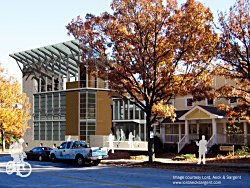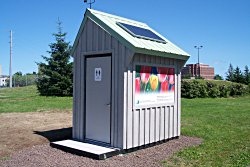Golf Industry Show, Orlando, FL
Jan. 31 – Feb. 2, 2008
Visit us at booth #4543
American Institute of Architects National Convention and Design Exposition, Boston, MA
May 15-17, 2008
Clivus Presentation: Friday, May 16, 2008, 6:00-7:00 pm |
| eFact |
Top Soil in Trouble
Due to human impacts, the world loses 7% of its topsoil every ten years. It takes 1,000 years to produce one inch of topsoil.
source: Almanac of the Environment, National Audubon Society, 1994 (From: www.ecocycle.org) |
| Also of Interest |
Project of the Year
We are proud to announce that the Bronx Zoo Eco-Restroom, which includes 14 Clivus Multrum Foam-Flush Composting Toilet Systems, was recently named Environmental Project of the Year by New York Construction. The Eco-Restroom was also a runner-up for a 2007 Water Efficiency Leader Award from the U.S. EPA.
Clivus earned additional recognition in the November issue of Recreation Management, where the Lost Dog Wash Access Area—a recent Clivus project—was featured in a story about the importance of clean, accessible park restroom facilities.
Maintenance Services
Did you know that Clivus can arrange to provide your facility with composting system maintenance services? Clivus offers a variety of maintenance options to meet your needs. No matter where your facility is located, we’ll come to you or work with local subcontractors to ensure that the job is done right. Call us at 800-425-4887 for more information. |
|
Greetings from Clivus Multrum!
This issue of the Natural Solution News discusses two contrasting projects. The first article describes Southface Energy Institute’s expanded headquarters, in downtown Atlanta, which doubles as a green building technology demonstration facility. The second article discusses a series of eight Trailhead systems purchased by the Greater Moncton Sewerage Commission in New Brunswick, for use on a local, community trail. Although the application of Clivus technologies is quite different in these projects—urban office, on one hand, and trail system, on the other—they reflect similar motivations: to provide environmentally sustainable toilet systems for public use.
Southern Water Woes and How to End Them
 |
| Rendering of the new Southface Eco-Office |
The southeastern United States is currently facing its worst drought in over a century, and Greater Atlanta, the region’s largest metropolitan area, with over 5,000,000 residents, is facing severe water shortages. But although the rain is likely to return, Atlanta’s water related worries will not go away.
Greater Atlanta is currently the fastest growing metropolitan area in the country, adding 890,000 residents since 2000. The added population has created additional strain on the city’s drinking water and wastewater treatment systems. Not surprisingly, the city’s response includes spending lots of money ($3.9 billion) on sewer expansion and water treatment to accommodate growth. For 25 years, Southface Energy Institute has taken a leading role in educating the area’s building professionals and consumers on ways to conserve water. And now, with the use of the Clivus Multrum compost toilet, Southface is demonstrating a technique that both conserves water and makes unnecessary the vastly expensive and disruptive practice of sewer expansion.
| The Eco Office will reduce water consumption by 70% - 80% and showcase a variety of innovative efficiency and alternative supply options. |
Although Southface originally focused on residential green building, Executive Director Dennis Creech says, “Over 10 years ago we decided that to address climate change, fresh water and other serious environmental challenges we needed to expand our services to commercial buildings as well as to broader community development issues.” And as momentum for both residential and non-residential green building has grown, Southface has expanded too. In the summer of 2005, Southface broke ground on its new 10,000 square foot Eco-Office. Designed by Lord, Aeck & Sargent to achieve the U.S. Green Building Council’s highest level of certification, LEED Platinum, the Eco-Office is more than just a new headquarters for Southface’s growing staff. Southface Executive Director Dennis Creech explains, “The Eco Office will reduce water consumption by 70% - 80% and showcase a variety of innovative efficiency and alternative supply options. The Eco Office will be open daily for tours and will host a variety of training workshops and other educational programs. Water usage throughout the Eco Office will be monitored and performance data made available to the general public and research community via the Internet.”
The building includes one large Clivus Multrum Composting System--sized to accommodate 20 people-- with two foam-flush toilets and a waterless urinal. The foam-flush toilets reduce water used for flushing by over 97%, as compared to conventional low-flow toilets. That translates to a yearly water savings of up to 60,000 gallons of water per year. In addition to the Clivus systems, the Eco-Office includes dual-flush toilets, pressure assist toilets, low-flow automatic faucets, rainwater collection, and a green roof. Collected rainwater is used to flush toilets, so no potable water is used for that purpose.
Southface Project Manager Frank Burdette says, “For the Southeast to balance future growth with its limited water resources, the building industry must consider the full range of water efficient fixtures. Clivus Multrum’s products represent some of the most efficient options for commercial and residential applications alike.” Perhaps, in the near future, governments, such as Atlanta’s will begin to see, thanks to the work of organizations such as Southface, how well the compost toilet addresses the pressing issues of growth and water resources.
Northern Sewerage Commission Goes Clivus
 |
| One of eight Moncton Trailheads |
No, we don’t mean the sewer is being replaced by Clivus systems. Not yet, anyway. But the Greater Moncton Sewerage Commission, in New Brunswick, has taken a first step by using the Clivus Multrum Trailhead along a 13 mile urban, riverfront path it provides for walkers, joggers, and bikers.
In the spring of 2004, the Commission purchased four Clivus Multrum M54 Trailhead Composting Toilet Systems for the path. According to Special Projects Manager Roland Richard, the Commission wanted to provide toilets that would be “environmentally sustainable.” The Commission had seen the Trailhead in nearby Bouctouche, at the Irving Dune Interpretive Center, and understood that it met that criteria. The Trailheads in Moncton have not disappointed. In addition to their environmental benefits, Richard says the systems have been greatly appreciated by local trail enthusiasts.
Due to the success of the original four, the Commission has since purchased an additional four Trailheads for the path. The eight public-use Trailheads have been placed at strategic locations throughout the Moncton, Riverview, and Dieppe sections of the path. For trail users, this is a major improvement over the scattered port-a-johns of the past. And in a few years, the Trailheads are expected to provide another benefit: topsoil-like compost for use onsite.
| The Moncton Trailheads serve as a reminder that the Trailhead system is not only appropriate for remote locations. |
The Trailhead is available in a number of finishes and styles. For this project, the Trailhead kits were customized with an Acadian-style roof, built on-site. The Moncton Trailheads are of the single-stall variety, although double-stall versions are also available. Single-stall versions can accommodate up to 22,000 uses annually, and double-stall versions can handle 44,000 uses. All Trailheads use a fan powered ventilation system to keep the toilets odorless. And in addition to producing solid compost, the Trailhead, like all Clivus systems, also produces a safe, stable liquid end-product, which is well-suited for use as a fertilizer. The Moncton Trailheads serve as a reminder that the Trailhead system is not only appropriate for remote locations. The Trailhead should be considered for any location where a simple, compact, environmentally-responsible restroom is needed.
For Moncton, the choice was simple and the result has been satisfying. The Sewerage Commission contributed environmentally responsible amenities to the community and the community is pleased. Perhaps the commission will get hooked on Clivus.
|
